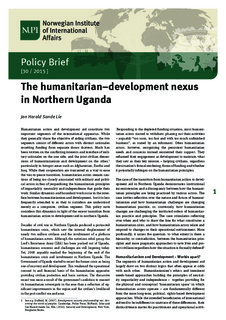The humanitarian–development nexus in Northern Uganda
Research report
Permanent lenke
http://hdl.handle.net/11250/2367856Utgivelsesdato
2015Metadata
Vis full innførselSamlinger
- NUPI Policy Brief [232]
- Publikasjoner fra Cristin - NUPI [1426]
Sammendrag
The instituted order of humanitarianism is both changing and challenged by shifting circumstances in the area in which humanitarian organisations operate. This article addresses the transition between humanitarian action and development aid in Northern Uganda, a transition that was driven by and large by the host government’s ambition to reassert its humanitarian sovereignty in the area, enabled by its discursive recast of the situation from one of crisis to one of recovery and development. This recast happened in spite of the persistent humanitarian sufferings and needs in the post-conflict area. Yet, it drove humanitarian donors and organisations to reorient their work. While some withdrew, others moved into more development oriented aid, showing organisational malleability and that the humanitarian principles are losing their regulatory hold over humanitarian action. In response to the transition, some originations payed heed to the sanctity of the humanitarian principles fearing jeopardising the humanitarian space, while other took a pragmatic stance to continue assist the civilians regardless how the situation was being portrayed. Hence, this article, demonstrating the formation of a humanitarian—development nexus, speaks to the wider debates about the relationship between humanitarian principles and pragmatic approaches and the evolving humanitarian mission creep – all central to general debates about the nature and future of humanitarianism.
Beskrivelse
The policy brief is a deliverable from the project “Protection of Civilians. From Principles to Practice”, funded by the Norwegian Research Council. This project is associated with the collaborative Norwegian Centre for Humanitarian Studies (NCHS) – www.humanitarianstudies.no

